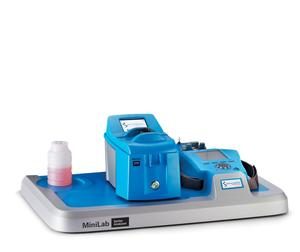ON-SITE OIL ANALYSIS SYSTEM FOR INDUSTRIAL MACHINERY

Minilab 23 as Oil analysis provides early indications of equipment wear and identifies the root causes of corrosion. On-site oil analysis eliminates the wait associated with sending samples off-site and enables immediate decision making.
With two simple tests, the MiniLab 23 delivers on-site oil analysis, providing immediate actionable results, saving time and reducing costs. Highlights of this system include:
- One product, delivering lab-quality analysis outside of the lab
- Simplified workflow for the non-expert user, no chemist required
- Simplified data handling and report interpretation via OilView and Trivector reporting
Minilab 23 Highlights
The MiniLab 23 provides oil condition information including viscosity, chemistry and water in oil. This capability is the foundation of an oil analysis program.
Trivector™ – oil and machine health simplified

The MiniLab 23 combines two simple tests that take less than 7 minutes to complete
(Click on any two tests images below to watch how-to videos)
.jpg) |
 |
 |
| Parameter | Viscosity
ASTM Method D8092 |
Chemical
ASTM Method D7889 |
|
| Contamination | Particle count and ISO codes | ||
| Non-metallic particle count, distribution and images | |||
| Boron, Calcium, Sodium, Lithium, Potassium and Silicon | |||
| Water | V | ||
| Chemistry | Viscosity | V | |
| Total Acid Number (TAN) | V | ||
| Oxidation | V | ||
| Total Base Number (TBN), Oxidation, Nitration, and Sulfation for engine oils | V | ||
| Boron, Magnesium, Calcium, Barium, Zinc, Molybdenum, and Phosphorus | |||
| Wear | Wear particle images, counts and distribution | ||
| Total Ferrous content, ppm | |||
| Ferrous particle count and size distribution | |||
| Copper, Silver, Chromium, Titanium, Aluminum, Magnesium, Nickel, Iron, Manganese, Lead, Tin, Molybdenum, Cadmium, and Vanadium |
OilView™ LIMS asset management software

Target Industries
The MiniLab 23 is ideal for a wide range of industries such as:
Typical limits for machinery
The most common oil analysis tests and typical alarm limits for several component types are shown below. Component manufacturers establish alarm limits for their equipment for specified parameters.

| Parameter | Viscosity ASTM Method D8092 |
Chemical ASTM Method D7889 |
|
| Contamination | Particle count and ISO codes | ||
| Non-metallic particle count, distribution and images | |||
| Boron, Calcium, Sodium, Lithium, Potassium and Silicon | |||
| Water | V | ||
| Chemistry | Viscosity | V | |
| Total Acid Number (TAN) | V | ||
| Oxidation | V | ||
| Total Base Number (TBN), Oxidation, Nitration, and Sulfation for engine oils | V | ||
| Boron, Magnesium, Calcium, Barium, Zinc, Molybdenum, and Phosphorus | |||
| Wear | Wear particle images, counts and distribution | ||
| Total Ferrous content, ppm | |||
| Ferrous particle count and size distribution | |||
| Copper, Silver, Chromium, Titanium, Aluminum, Magnesium, Nickel, Iron, Manganese, Lead, Tin, Molybdenum, Cadmium, and Vanadium |
TruVu 360 Enterprise Fluid Intelligence
The Minilab 23 uses the TruVu 360 Enterprise Fluid Intelligence software which includes an Asset Management database and a reference oil database which can be expanded by the end user.
It provides a standard sample trend reports and Diagnostic Sets with alarm limit templates, diagnostics, and recommended actions. It can support automatic email distribution of reports.
Color-coded Trivector reports provide a clear snapshot of machinery health by identifying parameters that are outside normal limits.
Accessories & Consumables
Sample Preparation – 1 Simple Step
- Homogenize the sample for better water measurement
MiniLab 23 consumables: Cleaning pad, pipette tips, small bottles for water preparation.
Spectro Scientific consumables ensure high accuracy and repeatability